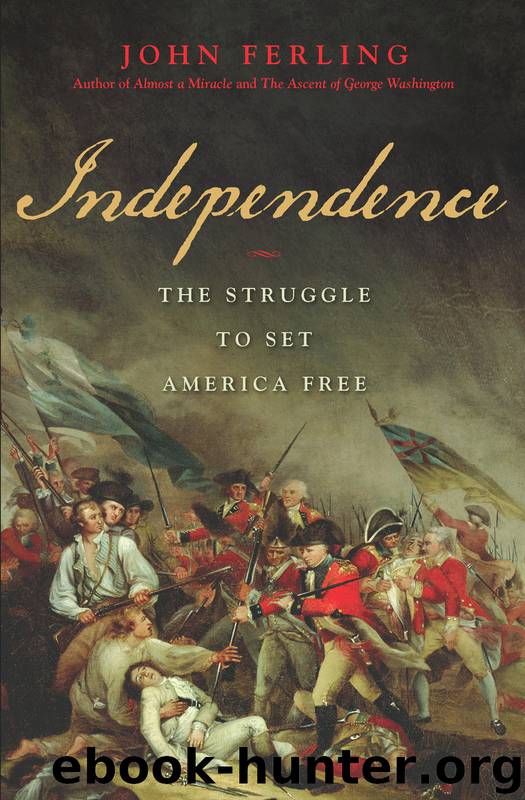Independence by John Ferling

Author:John Ferling
Language: eng
Format: epub
Publisher: Bloomsbury Press
Published: 2011-03-24T16:00:00+00:00
The Death of Montgomery by John Trumbull. General Richard Montgomery, commander of the American army that attacked Quebec on December 31, 1775, was killed in the engagement. One third of Montgomery’s army was lost, nearly five hundred men. (Yale University Art Gallery/Art Resource, NY)
There were those, like New York’s Robert R. Livingston, who wished to pull out of Canada immediately. The place would bleed the colonies to death both in human and economic terms, he argued, adding that it was “most evident that the Canadians are not to be relied on” to bear arms. He thought it wiser to withdraw and prepare defenses along the Canadian border. There were also some congressmen who saw the debacle as a “needfull” demonstration of “our Dependence” on foreign assistance, especially as the notion was growing that this might be a protracted war, one in which America’s staying power hinged on acquiring a wide variety of military supplies from abroad.
But the viewpoint around which a majority of congressmen coalesced in January was to send another army into Canada “with the utmost Dispatch.” The delegates reasoned that Quebec City might still be taken before British reinforcements arrived, which would not occur until the St. Lawrence thawed in the late spring. Some believed there was no choice but to continue to fight for Quebec. Should the British regain their citadel, they warned, the royal authorities would mobilize the Canadians and the Indians against the colonists, and they would strike the northern provinces with “a force … more formidable than that of all the British Troops they can import into America.”
Some saw another urgent reason for continuing to campaign for Quebec. Word had reached Philadelphia of both the king’s address and Germain’s remarks hinting that peace commissioners might be sent across the sea. Some believed that if Canada could be taken before the envoys arrived, it would be an important bargaining chip in the negotiations with the commissioners. Within seventy-two hours of learning of the defeat at Quebec, Congress not only ordered seven regiments to be raised and sent to Canada but also, for the first time, authorized the payment of bounties to raise recruits for the Canadian army. Quietly, too, news of the setback at the gates of Quebec stirred the Committee of Correspondence to let contracts with Pliarne and Penet, the two Nantes merchants who had languished impatiently for weeks in Philadelphia. With the sanction of Congress, trade was opened with France in order to secure arms and munitions.40
Just days before word of the Canadian calamity reached Congress, an express arrived with the first tidings of George III’s October address to Parliament. “It is decisive,” a New Englander instantly responded. No greater proof was needed that Britain’s monarch “meant to make himself an absolute despotic Tyrant.” Samuel Ward added that “Every Man must now be convinced that … our Safety depends wholly upon a brave, wise and determined Resistance.” Samuel Adams told others that this proved the king was the driving force behind British policy. War guilt “must lie at his Door,” he added.
Download
This site does not store any files on its server. We only index and link to content provided by other sites. Please contact the content providers to delete copyright contents if any and email us, we'll remove relevant links or contents immediately.
| Africa | Americas |
| Arctic & Antarctica | Asia |
| Australia & Oceania | Europe |
| Middle East | Russia |
| United States | World |
| Ancient Civilizations | Military |
| Historical Study & Educational Resources |
Washington by Ron Chernow(682)
Patriot Pirates by Robert H. Patton(619)
James Madison: A Life Reconsidered by Lynne Cheney(604)
American Tempest by Harlow Giles Unger(598)
The Radicalism of the American Revolution by Gordon S. Wood(560)
John Adams by David McCullough(553)
Mary Ball Washington by Craig Shirley(541)
George Washington's Secret Six by Brian Kilmeade(532)
A Wilderness So Immense by Jon Kukla(483)
American Revolution For Dummies by Steve Wiegand(477)
The Whites of Their Eyes by Jill Lepore(474)
To Begin the World Over Again by Matthew Lockwood(466)
The American Revolution: A History by Gordon S. Wood(454)
Revolutionary Summer: The Birth of American Independence by Joseph J. Ellis(452)
Poor Richard's Almanack by Benjamin Franklin(433)
The Federalist papers by Alexander Hamilton; James Madison; John Jay; Lawrence Goldman(424)
Henry Knox: Visionary General of the American Revolution by Mark Puls(417)
Founding Brothers: The Revolutionary Generation by Joseph J. Ellis(407)
Independence by John Ferling(403)
